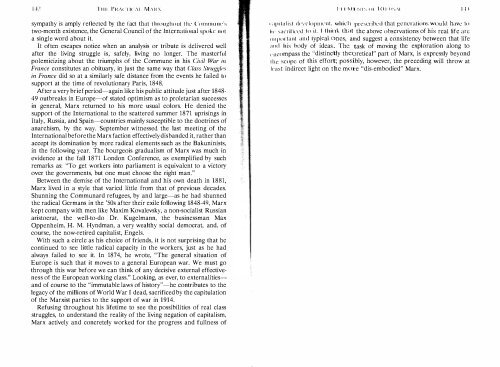CONTENTS - ouroboros ponderosa
CONTENTS - ouroboros ponderosa
CONTENTS - ouroboros ponderosa
Create successful ePaper yourself
Turn your PDF publications into a flip-book with our unique Google optimized e-Paper software.
'1 ' 111' I'HI\( TIt ,\1 M;\H\<br />
sympathy is amply reneeted by the fact that thlOuglHlut thl' ('OIll"""W"<br />
two-month existence. the General Council of the International spoke "ot<br />
a single word about it.<br />
It often escapes notice when an analysis or tribute is delivered well<br />
after the living struggle is. safely, living no longer. The masterful<br />
polemieizing about the triumphs of the Commune in his Civil War ill<br />
France constitutes an obituary, in just the same way that Class Struggles<br />
in France did so at a similarly safe distance from the events he failed to<br />
support at the time of revolutionary Paris, 1848.<br />
After a very brief period-again like his public attitude just after 1848-<br />
49 outbreaks in Europe-of stated optimism as to proletarian successes<br />
in general, Marx returned to his more usual colors. He denied the<br />
support of the International to the scattered summer 1871 uprisings in<br />
Italy, Russia, and Spain-countries mainly susceptible to the doctrines of<br />
anarchism, by thc way. September witnessed the last meeting of thc<br />
International before the Marx faction effectively disbandcd it, rather than<br />
accept its domination by more radical elements such as the Bakuninists,<br />
in the following year. The bourgeois gradualism of Marx was much in<br />
evidence at the fall 1871 London Conference, as exemplified by such<br />
remarks as: "To get workers into parliament is equivalent to a victory<br />
over the governments, but one must choose the right man."<br />
Between the demise of the International and his own death in 1881,<br />
Marx lived in a style that varied little from that of previous decades.<br />
Shunning the Communard refugees, by and large-as he had shunned<br />
the radical Germans in the '50s after their exile following 1848-49, Marx<br />
kept company with men like Maxim Kovalevsky, a non-socialist Russian<br />
aristocrat, the well-to-do Dr. Kugelmann, the businessman Max<br />
Oppenheim, H. M. Hyndman, a very wealthy social democrat, and, of<br />
course, the now-retired capitalist, Engels.<br />
With such a circle as his choice of friends, it is not surprising that he<br />
continued to see little radical capacity in the workers, just as he had<br />
always failed to see it. In 1874, he wrote, "The general situation of<br />
Europe is such that it moves to a general European war. We must go<br />
through this war before we can think of any decisive external effective<br />
ness of the European working class." Looking, as ever, to externalities<br />
and of course to the "immutable laws of history"-he contributes to the<br />
legacy of the millions of World War I dead, sacrificed by the capitulation<br />
of the Marxist parties to the support of war in 1914.<br />
Refusing throughout his lifetime to see the possibilities of real class<br />
struggles, to understand the reality of the living negation of capitalism,<br />
Marx actively and concretely worked for the progress and fullness of<br />
1.111'v1 I ' N'I, III 1,101-11:;,\1 t 1\<br />
(;lpilalist dn!dopllll'lIt, wliich prescrihld that generations wou ld havc to<br />
Iw sacrificed to it. I think that the ahove ohservations of his real life an:<br />
IIlI l 'mtallt and typical ones, and suggest a consistency between that life<br />
;11111 his body of ideas _ The task of moving the exploration along to<br />
," ncompass the "distinctly thcoretical" part of Marx, is exprcssly beyond<br />
llie scope of this effort; pOSSibly, however, the preceding will throw at<br />
least indirect light on the mell"e "dis-embodied" Marx.






